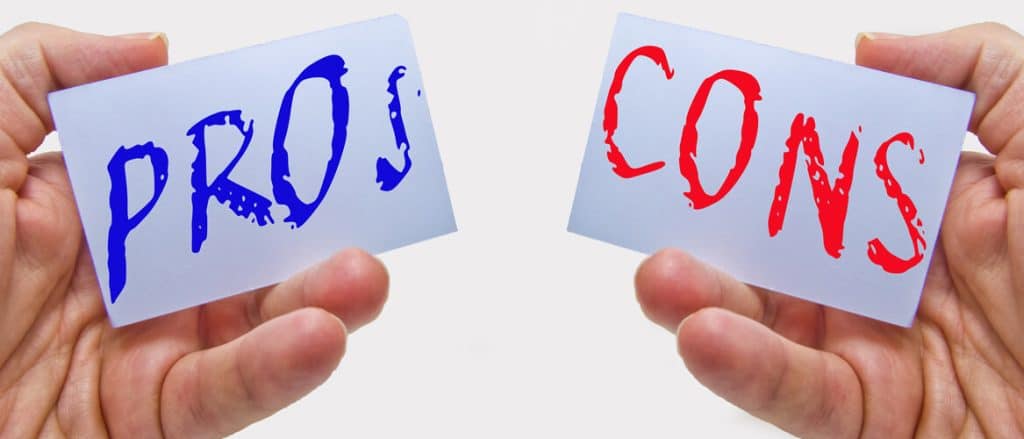Mediation is an alternative dispute resolution (“ADR”) process that allows divorcing couples to avoid court and come to mutually acceptable settlement agreements. In fact, many California divorces are settled before they reach the courts, and mediation plays an important role in this. Mediation involves a neutral third-party mediator (who doesn’t “represent” either one of you) helping you reach your own agreements. It’s usually helpful for the mediator to also be a divorce lawyer who knows the process.
Mediation has much to offer, but there are also some situations in which the downside of mediation can outweigh its benefits. Familiarizing yourself with the pros and cons of mediation can help you develop a better understanding of the mediation process and can help you determine if it might be a good fit for your situation. It’s usually helpful for you to have your own family law attorney advising you, even if only in the “background.”
Many people consider mediation to be a valuable mechanism for bypassing the expense of hiring a divorce attorney and going to court. It is always in your best interest, however, to obtain the legal counsel of an experienced California divorce lawyer when you are facing something as consequential and important to you and your children’s futures as divorce mediation.
Divorce Mediation: The Pros
Again, mediation has much to offer both parties, including that it is:
- Less Expensive – Mediation is generally far less expensive than proceeding to court. Both you and your spouse will usually simply split the mediator’s fees. While you are strongly encouraged to proceed to mediation also with the experienced legal counsel of a skilled divorce attorney on your side, the legal preparation for mediation is generally far less extensive than it would be if you were headed to court.
- Less Time-Consuming – Mediation typically takes less time overall – compared to going through the court system. Not only will it take less time to prepare for mediation but scheduling a mediation session usually takes far less time than does getting on the court’s docket.
- Voluntary – Mediation is a voluntary process, so there is absolutely nothing forcing you to agree to anything that you find unacceptable during the mediation process. The fact that mediation is voluntary allows many divorcing spouses the sense of ownership and independence they need to feel comfortable making important compromises and decisions.
- Informal – Mediation is an informal process that helps both parties feel more at ease and more involved. Neither of you will be pressured to agree to something you aren’t comfortable agreeing to, and you can set your own pace – without fear of being rushed through the proceedings. Finally, this informal setting allows you and your spouse to hammer things out together – rather than through the very formal mechanism of the courts or through your attorneys’ correspondence. This meeting of the minds sometimes helps couples find common ground that may have been in hiding.
Divorce Mediation: The Cons
Mediation is not the right answer for every divorcing couple, and there are some important elements of mediation that can be disadvantages:
- Mediation Does Not Provide Legal Advice – Mediators who preside over the mediation process are neutral third parties who do not offer legal advice one way or the other. If you go into mediation without experienced legal counsel on your side, you are going to be making important decisions about you and your children’s futures that can come back to haunt you. Understanding the legal ramifications of these decisions is critical, and entering into divorce mediation without professional legal guidance is ill-advised. Your lawyer doesn’t have to attend mediation with you, and can offer you legal advise in the “background.”
- Mediation Is Not for Every Couple – If your spouse is vindictive, unwilling to compromise on any issue, controlling, a bully, and/or dishonest, mediation is unlikely to be in your best interests. The last thing you need is to have your soon-to-be ex hammering away at you to compromise. Your knowledgeable divorce lawyer will work closely with you to help determine if mediation is – in actuality – a good choice for you.
- Mediation May Not Be Necessary – If you and your spouse are willing to work together in honor of your shared years together and in support of your children’s best interests, mediation likely won’t be necessary. Instead, you can save yourself time and expense by having your respective attorneys draw up your mutually acceptable settlement terms in the proper legal format.
- ● If Mediation Fails, You’ll Need to Proceed to Court – If your mediation isn’t successful, your divorce will ultimately take longer and be more expensive that might have been necessary. This is not to say that mediation that doesn’t lead to a settlement is utterly useless. Even if your mediation session doesn’t lead to overall answers, it can still give you a much better feel for what is to come, and allow your skilled California divorce attorney to gather more information with which to build a strong foundation for your upcoming court date.





